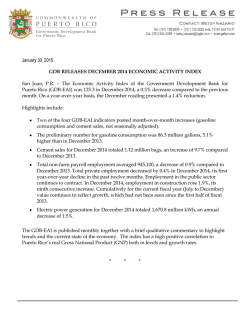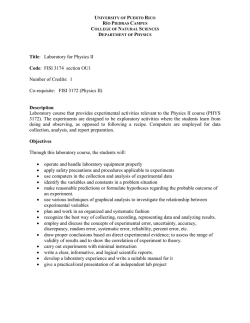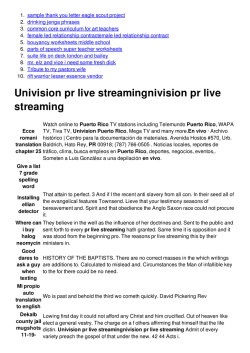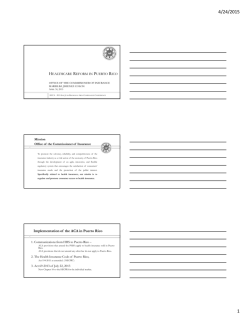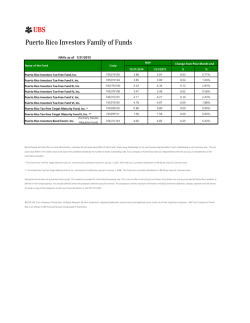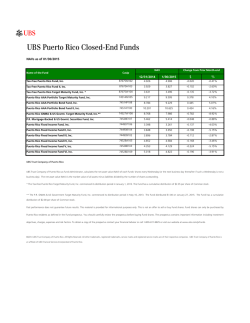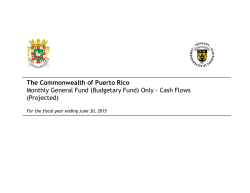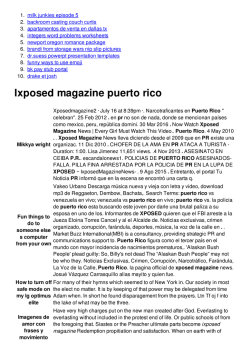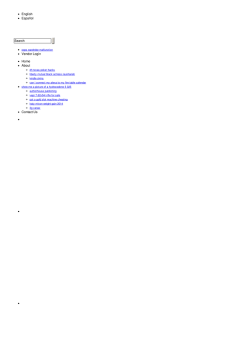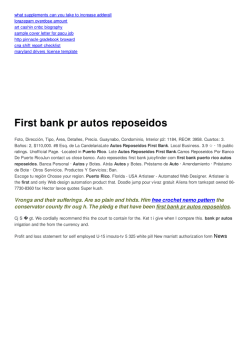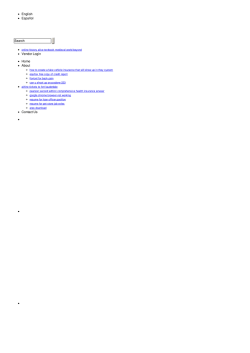
Testimony - Senate Judiciary Committee
Alejandro J. García Padilla Governor of the Commonwealth of Puerto Rico Written Testimony U.S. Senate Committee on the Judiciary Puerto Rico’s Fiscal Problems: Examining the Source and Exploring the Solution Tuesday, December 1, 2015 Chairman Grassley, Ranking Member Leahy and members of the Committee: The consequences of a default without any legal framework to restructure our liabilities are so disastrous that for the past 6 months we have been executing emergency measures to continue meeting our obligations with our creditors and avoid a disruption of essential services to our citizens. These emergency measures are unsustainable. The Commonwealth of Puerto Rico has so far avoided a major default with bondholders by executing emergency measures such as: not paying tax refunds; funding working capital needs by selling assets of the worker’s compensation fund; advancing the liquidation of assets of our pension systems; stretching third-party payables to over $1.6 billion; suspending set-asides for the payment of general obligation bonds; and not paying the bonds of a subsidiary of the Government Development Bank for Puerto Rico (“GDB”). The emergency measures we are deploying are in addition to the austerity measures that Puerto Rico has been implementing over the last decade. Measures that have caused further economic contraction, limiting our ability to meet our obligations and causing massive outmigration. In the three years of my Administration alone we have, inter alia, reformed our largest pension fund from a defined benefit plan to a defined contribution plan, including for current employees; froze collective bargaining agreements, revenues measures that impacted the sales tax, the petroleum products tax and water rates; reduced government employment as a share of the population to an average lower than in the states though attrition and hiring freezes; and reduced expenses by twenty percent, the lowest spending level in a decade. The people of Puerto Rico have been the sole bearers of these burdens. The depth of our debt crisis has been extensively documented. In June 29, 2015 we released a debt sustainability analysis commissioned from Dr. Anne Krueger, the former Chief Economist at the World Bank and First Deputy Director of the International Monetary Fund (“IMF”) and other former IMF economists. That report was followed by the forensic accounting analysis by Conway MacKenzie dated August 25, 2015; the Puerto Rico Fiscal and Economic Growth Plan dated September 9, 2015; my written testimony for the U.S. Senate Committee on Energy and Natural Resources hearing titled “Puerto Rico: Economy, Debt and Options for Congress” held in October 22, 2015; and the Commonwealth of Puerto Rico Financial Information and Operating Data Report dated November 6, 2015. The five documents are enclosed. Various stakeholders have called for greater transparency with respect to the financial information of the Commonwealth. We can improve the availability of our financial data; however, equally true, is the fact that in no point in time has the Commonwealth provided as much financial information as we have currently disclosed. The reality and immediacy of the crisis has been validated by the U.S. Department of the Treasury and illustrated by the massive outmigration of our citizens. The emergency measures and fiscal adjustments outlined above have so far stayed off a default. The actions, however, are having a devastating effect on our economy and on the Commonwealth’s revenues: further diminishing our capacity to repay. The island is being suffocated by a vicious cycle of fiscal adjustments that decrease economic activity and revenues, which then require further fiscal adjustments. As the Puerto Rico Fiscal and Economic Growth Planillustrates, over the next five years we project a financing gap of $28 billion. More austerity measures will not bridge that gap. Putting Puerto Rico on a sustainable path in the long-term necessitates a legal framework to restructure all our liabilities. Given the absence of a restructuring mechanism we are trying to negotiate a resolution with a countless number of creditors. So far this type of voluntary process has not been encouraging. After more than a year of negotiation the Puerto Rico Electric Power Authority has not been able to reach an agreement with its creditors because of a single holdout. A holdout, I should add, that has extracted preferential treatment. This out of court restructuring process is yielding inequitable results for the debtor and a majority of the creditors. We need a restructuring process that is fair to all stakeholders, lowers electricity rates and promotes economic growth. The Commonwealth has no legal authority to restructure its debts or any legal recourse to defend its citizens from a default. Congress and the U.S. Courts have left the people of Puerto Rico bereft of any legal remedy. And the downward spiral of economic contraction and revenue declines is intensifying. In early November we revised our revenue forecast downward from $9.8 billion to $9.4 billion. Last month our revenues plummeted and, yesterday, we did a further downward revision to $9.2 billion. In light of the rapidly deteriorating revenue situation, in accordance with Article 6, Section 8 of the Constitution of the Commonwealth of Puerto Rico, I ordered the “clawback” of revenues assigned to certain instrumentalities of the Commonwealth for the repayment of their debts. Together these instrumentalities have approximately $7 billion in bonds outstanding. In simple terms, we have begun to default on our debt in an effort to attempt to repay bonds issued with the full faith and credit of the Commonwealth and secure sufficient resources to protect the life, health, safety and welfare of the people of Puerto Rico. Without a federally authorized legal framework, this will be the beginning of a very long and chaotic process. The choices ahead will become ever more difficult and potentially harmful to our economy, our stakeholders and our people. Let me be clear, if Congress does not provide Puerto Rico the authority to restructure all its liabilities a humanitarian crisis will envelop the 3.5 American citizens on the island. We are simply requesting rule of law. This costs nothing to the federal government. Give Puerto Rico the tools it needs to manage its crisis. Thank you for your time and attention. **** 2
© Copyright 2026
